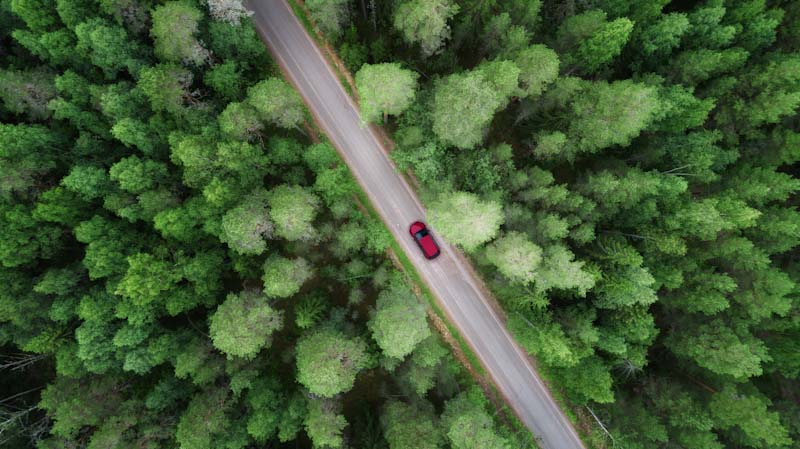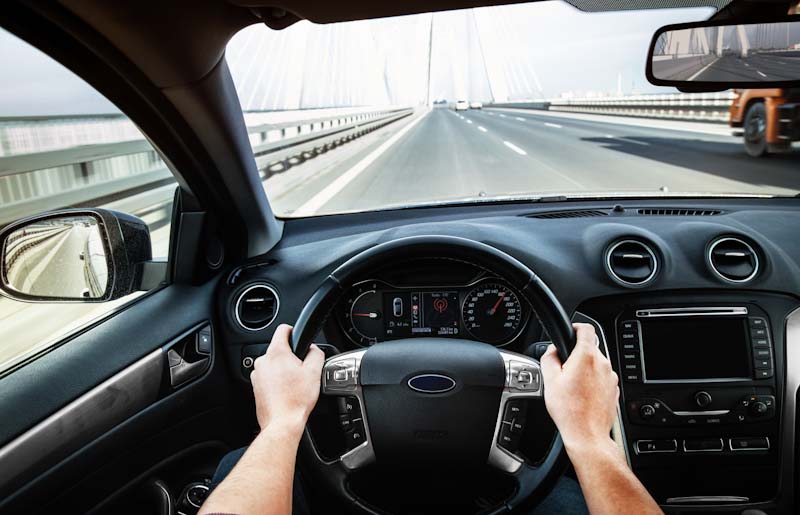Long-distance travel could become extremely difficult and dangerous in a SHTF scenario. Food, fuel and other essentials would be scarce. Traffic laws would no longer apply. Thieves and other unsavory characters would stalk the major roadways and target vulnerable travelers.
Here are the top 10 need-to-know tips to prepare for these threats if a SHTF scenario occurs.
1. Stock up on Food and Fuel
The mark of a true survivalist is a hidden bunker or supply room full of water containers, nonperishable food and other essential survival items you might need. Stocking up on precious supplies is the first and most important step in preparing for any SHTF scenario.
When it comes to fuel, you can start by keeping your car’s gas tank full with frequent top-offs.
Buy some spare gas cans and fill one with extra fuel every few weeks. Gasoline can last up to six months in storage, so you should be able to put together a healthy supply. Clearly label each can to ensure you refill your vehicle with the oldest gas and don’t waste the freshest gas.
People like to think SHTF scenarios are highly unlikely, but fuel scarcity is starting to look like a real possibility in Europe and the U.S. A gas shortage could impact your community in the coming months. While angry mobs of unprepared citizens pile up at gas stations, you’ll already be leaving town for a safer place thanks to your personal fuel supply.
You might also consider growing your own food with small livestock or a vegetable garden. Supply chains will collapse, fresh food deliveries will disappear and grocery stores will get picked clean in a matter of weeks during a SHTF scenario. Having your own sustenance could mean the difference between life and death if you need to travel a long distance.
2. Pack an Emergency Travel Bag
The key to surviving any community emergency is to leave the area ASAP. You can’t afford to lollygag. That’s why you need to pack an emergency travel bag so you can skip town quickly. Your bag should contain food, water, extra clothes, navigation tools and a weapon for self-defense. Keep it in the trunk of your car at all times.
You might not be at home when disaster strikes, so leaving all your belongings in one place doesn’t make sense. An emergency bag enables you to leave the area without stopping at home. You can pick up your loved ones and get out of dodge before traffic jams start to form. Your number of supplies might be limited, but it’s better than nothing.
3. Stock Your Car With Emergency Items
Along with packing an emergency bag, you should stock your car with other items for safety, maintenance and other miscellaneous tasks. If your home and neighborhood become dangerous, your vehicle is the next best option for consistent shelter and protection. Ensure you keep these items in your car:
- First-aid kit
- Sleeping bag
- Flashlight
- Pocket knife
- Owner’s manual
- Tire changing kit
- Jumper cables
- WD-40
- Duct tape
- Work gloves
- Lighter or matches
- Gas can
These items will help turn your vehicle into a portable shelter. You have all the necessary tools to administer first aid, make minor car repairs and refuel to continue your journey. There’s no guarantee that an ambulance or roadside assistance service will help you during a widespread disaster, so you must look after yourself.
4. Find a Vehicle With Good Mileage
Cars with mechanical problems and substandard mileage won’t last long in a SHTF scenario. If you’re not confident in your current vehicle, you need to make an upgrade. Smaller sedans from manufacturers such as Toyota, Ford, Subaru and Honda usually have the best mileage. Some models even reach over 50 mpg on highways.
A hybrid electric vehicle would also be a viable option in this situation. For example, the Mustang Mach-E can drive up to 300 miles on a single charge. Hybrids also give you two power sources, which would be extremely convenient during a fuel crisis. You can rely on the car’s electric power — while the power grid is still up, anyway — and save your fuel for later.
5. Be a Fuel-Efficient Driver
Wasteful driving habits like idling and speeding will cost you precious gas in a SHTF scenario. You must work on being a fuel-efficient driver while things are still good. Keep these smart habits in mind:
- Don’t spend too much time idling.
- Take it easy on the gas and brake pedals.
- Follow the speed limit, especially on highways.
- Roll down the windows instead of relying on A/C.
- Anticipate the flow of traffic to avoid frequent starts and stops.
- Avoid adding heavy modifications to maintain the car’s weight and mileage.
These tips also apply to EVs, but EV owners also need to pay close attention to the weather. Batteries do not like cold weather, and their maximum range will plummet if you put them through harsh elements too often.
6. Invest in Car Security Features
Your car becomes your primary shelter during long-distance travel. You must protect it with security features just as you would your house. These security tools would make your journeys much safer:
- Wheel clamp: The car can’t move if one of the wheels is clamped in place. Police and towing companies often use wheel clamps to repossess stolen or unregistered vehicles.
- Steering wheel lock: This item locks the steering wheel in place, preventing anyone from moving far enough to complete a turn.
- Brake/clutch lock: A lock on the clutch or brake prevents thieves from using the pedal until it’s disabled with a code or key.
- Fuse cutoff: This device prevents the vehicle from starting until a secret button is activated.
- Engine killswitch: Kill switches enable you to turn off the engine without sitting behind the wheel.
- GPS tracker: The owner can use a GPS device to track the stolen car’s location. Ensure you have extra batteries if you plan to use this item.
You might think your vehicle is safe from thieves now, but that can change overnight. Your neighbors could become immediate threats in a survival situation. Security is a nonnegotiable step in preparing for travel in a SHTF scenario.
7. Find a Reliable Safe Haven
Most people have a safe haven in mind if they need to evacuate town, such as a nearby hotel or family member’s house. However, these places might not be available in a widespread SHTF scenario. You must build or find another more secure location that won’t be immediately compromised in a nationwide emergency.
A military base would be your best bet if you can’t build a secret shelter somewhere. These places are well-stocked with provisions, weapons and trained public servants and could become popular safe havens for desperate travelers. Make sure you know the directions to the nearest ones.

8. Map Out Multiple Routes
If you’ve seen or read the popular apocalyptic story “The Walking Dead,” you know traffic jams can be death sentences for travelers. With thousands of people leaving town at the same time, you can be sure that the main roadways will pile up within a few hours. Hysteria will ensue, and violence will inevitably break out.
That’s why you must map out multiple routes to ensure you don’t get trapped. Taking quieter backstreets is safer than relying on highways anyway. People looking to profit from the chaos will be stalking major roadways for stragglers. You might burn through fuel more quickly, but your safety is vital.
9. Choose Rest Stops Wisely
You must also choose your rest stops wisely. Gas stations and highway rest areas might not be safe in a SHTF scenario, especially if you’re carrying extra fuel and other precious supplies. You would be a high-priority target for thieves and scavengers. It’s always best to keep a low profile while traveling in an emergency.
When you need to stop to eat, refuel or use the bathroom, drive to a hidden area out of sight and earshot of the road. If you need to spend the night in your vehicle, look for places with natural cover, such as trees and boulders. You don’t want to go too far away from the road, though. You might have to make a quick getaway if you encounter dangerous strangers.
10. Keep Passengers Occupied
All these survival preparations boil down to one purpose: preventing panic. Panic leads to poor decisions, which can result in injuries or death. However, just because you’re calm in the face of disaster doesn’t mean your fellow travelers are. You must keep your passengers occupied to prevent panic from overtaking the group.
Provide everyone with meaningful tasks they can do to keep their minds off the present situation. Give children books, board games, puzzles and other distractions. Everyone should have something to do. This sense of purpose keeps your companions in the right state of mind and helps you focus on driving them to safety.
Be Prepared for Anything
Most of the global population isn’t prepared for a SHTF scenario. Only a small fraction of people have the supplies, skills and wherewithal to survive. Will you stay with the unprepared masses, or will you take steps to keep yourself and your family safe?
In this volatile world, you must be prepared for anything. Your vehicle is one of your most valuable assets, so you must take good care of it and stock it with the necessary provisions. These precautions will make your travels safer if and when the time comes.
























































































where can I find Engine Killswitch or Fuse cutoff? I have a Hyundai Tucson
Hi Sarah, there will be 2.places to find fuses, the most likely 1 will be under the bonnet near.the battery, you would remove the ignition fuse.
However a bette idea is to have a auto.sparky or good friend that knows 12volt systems to incorporate a kill switch in a location somewhere inside the car were it is concealed well, and where the wireimg is.concealed as well..